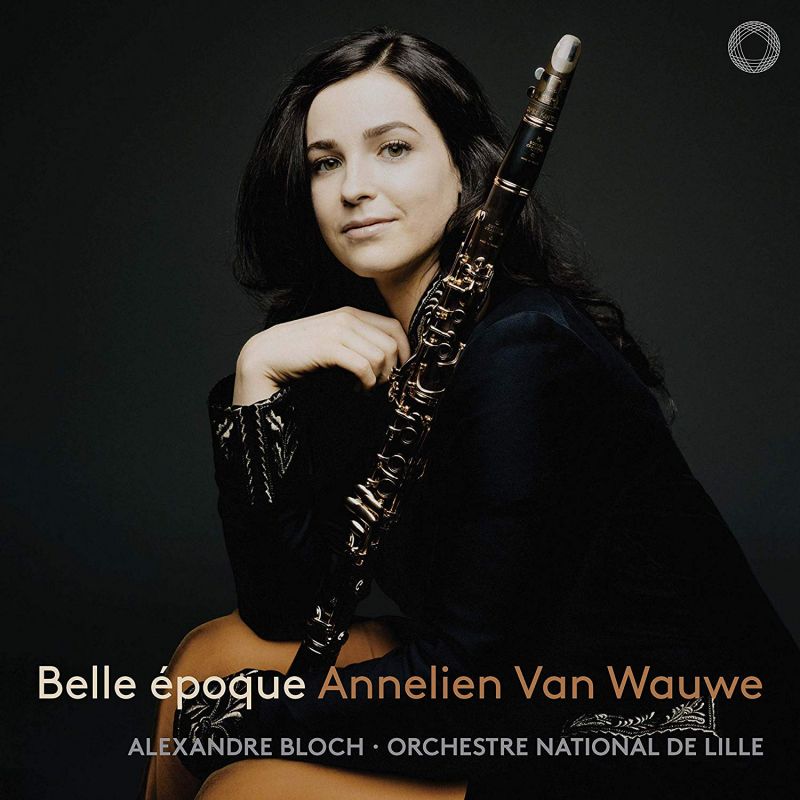Annelien Van Wauwe: Belle Époque
View record and artist detailsRecord and Artist Details
Composer or Director: (Henri Constant) Gabriel Pierné, Charles-Marie(-Jean-Albert) Widor, Claude Debussy, Johannes Brahms, Manfred Trojahn
Genre:
Orchestral
Label: Pentatone
Magazine Review Date: 11/2019
Media Format: Super Audio CD
Media Runtime: 60
Mastering:
DDD
Catalogue Number: PTC5186808

Tracks:
| Composition | Artist Credit |
|---|---|
| Première rapsodie |
Claude Debussy, Composer
Alexandre Bloch, Conductor Annelien Van Wauwe, undefined Claude Debussy, Composer Lille National Orchestra |
| Rhapsody for Clarinet and Orchestra |
Manfred Trojahn, Composer
Alexandre Bloch, Conductor Annelien Van Wauwe, Clarinet Lille National Orchestra Manfred Trojahn, Composer |
| Canzonetta |
(Henri Constant) Gabriel Pierné, Composer
(Henri Constant) Gabriel Pierné, Composer Alexandre Bloch, Conductor Annelien Van Wauwe, Clarinet Lille National Orchestra |
| Sonata for Clarinet and Piano No. 1 |
Johannes Brahms, Composer
Alexandre Bloch, Conductor Annelien Van Wauwe, Clarinet Johannes Brahms, Composer Lille National Orchestra |
| Introduction et Rondo |
Charles-Marie(-Jean-Albert) Widor, Composer
Alexandre Bloch, Conductor Annelien Van Wauwe, Clarinet Charles-Marie(-Jean-Albert) Widor, Composer Lille National Orchestra |
Author: Mark Pullinger
Debussy’s Prèmiere Rapsodie emerges gradually from the mists, immediately establishing the Belgian clarinettist’s warm, elegant tone and easy legato. Trills are evenly placed and the high notes are floated without becoming pinched. The Orchestre National de Lille prove sensitive partners, Alexandre Bloch bringing out the rich detail of Debussy’s orchestration. The two other brief French numbers come in rather twee orchestrations by Jelle Tassyns – lots of pretty percussion and coy flutes – but are attractively presented.
Nigel Simeone’s booklet note quotes Brahms’s letter to his clarinettist muse Richard Mühlfeld: ‘I have not been so impulsive as to write a clarinet concerto for you! But if everything goes well, there will be two modest sonatas with piano!!!???’ I’m not sure that gave licence for Luciano Berio to orchestrate that First Sonata, in F minor, for a concerto it is not. The problem for any sonata orchestration is that a sonata is essentially an instrument in harmony with the piano, whereas a concerto sets the solo instrument in (virtuoso) opposition to the orchestra. Brahms rarely pits the clarinet in opposition to the piano so the orchestral result is rather glutinous, the clarinet wallowing in stodge. Berio prefaces the first two movements with short introductions, both beside the point. Van Wauwe plays the sonata/concerto well though, her chalumeau register suitably juicy, and she floats the Andante un poco adagio second movement nicely, with great sensitivity to her phrasing.
The most interesting item on the disc is undoubtedly the Trojahn Rhapsodie. Just 18 minutes long, its three movements never outstay their welcome. The ‘Rêverie’ opens in suitably dreamy mode but soon turns nightmarish, with huge plunges from stratospheric top notes to the bottom. The second movement has a real cantabile character – do I detect traces of Tchaikovsy’s ‘None but the lonely heart’ there? – while the ‘Caprice’ is a helter-skelter high-wire act for the soloist, which Van Wauwe navigates with aplomb.
Discover the world's largest classical music catalogue with Presto Music.

Gramophone Digital Club
- Digital Edition
- Digital Archive
- Reviews Database
- Full website access
From £8.75 / month
Subscribe
Gramophone Full Club
- Print Edition
- Digital Edition
- Digital Archive
- Reviews Database
- Full website access
From £11.00 / month
Subscribe
If you are a library, university or other organisation that would be interested in an institutional subscription to Gramophone please click here for further information.




